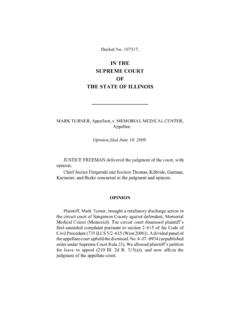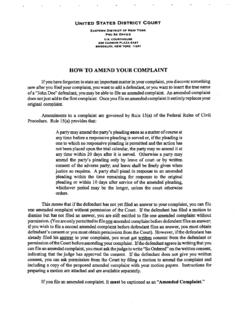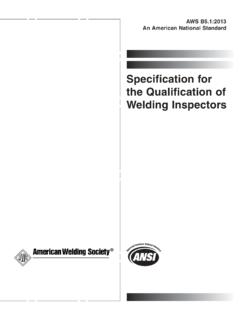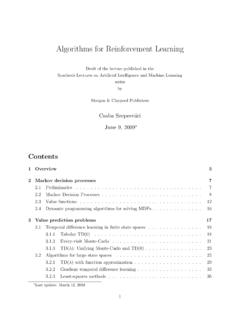Transcription of ORDER DENYING DEFENDANT'S REQUEST FOR PRODUCTION …
1 1. 2. 3. 4. 5. 6. 7. 8 UNITED STATES DISTRICT COURT. 9 EASTERN DISTRICT OF CALIFORNIA. 10. 11 DIANE THOMAS-YOUNG, Case No. 1:12-cv-01410-AWI-SKO. 12 Plaintiff, ORDER DENYING DEFENDANT'S REQUEST . 13 v. FOR PRODUCTION OF PLAINTIFF'S. MEDICAL AND PSYCHOTHERAPY. 14 SUTTER CENTRAL VALLEY RECORDS. HOSPITALS dba MEMORIAL. 15 MEDICAL CENTER, 16 Defendant. 17. 18 I. INTRODUCTION. 19 On June 26, 2013, an informal telephonic discovery dispute conference was held in 20 chambers and off the record before Magistrate Judge Sheila K. Oberto (Doc. 22.) On June 27, 21 2013, the Court issued an ORDER re: Informal Discovery Dispute Conference, memorializing the 22 Court's rulings during the conference. (Doc. 23.) In pertinent part, the Court ruled that Plaintiff 23 Diane Thomas Young's ("Plaintiff") "claim for 'garden variety' emotional distress damages does 24 not waive the privilege regarding the content of her medical and psychotherapy records; however, 25 facts concerning the existence of such treatment are not privileged.
2 " (Doc. 23, 2:26-3:1.) Based 26 upon the arguments of the parties during the informal discovery dispute conference, the Court 27 further ruled that Defendant Sutter Central Valley Hospital DBA Memorial Medical Center's 28 ("Defendant") "may file a supplemental brief, with citations to Ninth Circuit and/or California 1. 1 federal authority, to establish that Defendant is entitled to discovery of all of Plaintiff's medical 2 records due to Plaintiff's claim of garden variety emotional distress damages." (Doc. 23, 2:5-7.). 3 On July 1, 2013, Defendant submitted a Second Supplemental Brief re: Informal 4 Discovery Dispute seeking to compel the PRODUCTION of Plaintiff's medical records, contending 5 that Plaintiff's claim for emotional distress placed her mental and emotional condition at issue and 6 that Plaintiff waived her right to privacy or privilege in her medical and psychiatric records.
3 7 (Doc. 24.) On July 3, 2013, Plaintiff filed a Reply Brief to DEFENDANT'S Second Supplemental 8 Brief, contending that California district court cases have found in favor of non-disclosure of 9 medical records when a plaintiff alleges garden variety emotional distress. (Doc. 25.). 10 For the reasons set forth below, DEFENDANT'S REQUEST for PRODUCTION of Plaintiff's medical 11 and psychiatric records is DENIED. 12 II. FACTUAL AND PROCEDURAL BACKGROUND. 13 Plaintiff began working for Defendant as a Senior Philanthropic Advisor in September 14 2008. (Doc. 1, p. 11, 11.) Plaintiff asserts that she was recruited by Defendant over an 15 eight-month period while she was still employed with her longstanding employer, the American 16 Red Cross. (Doc. 1, p. 11, 12-13.) Plaintiff alleges that she negotiated a four-day workweek 17 prior to her employment with Defendant to be able to attend to her son's medical, legal, and life 18 needs; Plaintiff's son suffers from paranoid schizophrenia and is institutionalized.
4 (Doc. 1, pp. 19 11-13, 15-23.). 20 Plaintiff alleges that Defendant did not comply with the promises it had made regarding 21 personal time off and holiday pay, and further alleges that she was denied merit based salary 22 increases. (Doc. 1, pp. 13-15, 27-37.) During her time working for Defendant, Plaintiff 23 allegedly took protected family medical leave due to her and her mother's health conditions. 24 (Doc. 1, pp 15-16, 38-41.) Prior to her return to work, a new Executive Director was hired by 25 Defendant; the new Executive Director objected to Plaintiff's four-day workweek, despite 26 Plaintiff's explanation that she had negotiated the four-day workweek due to her son's 27 schizophrenia. (Doc. 1, pp 15-16, 42-44.) Plaintiff was informed that she would have a 28 different work schedule, that she was required to work five days per week, and that 2.
5 1 non-compliance would be interpreted as Plaintiff's voluntary resignation. (Doc. 1, p. 16, 45- 2 46.) Defendant would not reconsider its decision to alter Plaintiff's workweek despite Plaintiff's 3 written REQUEST . (Doc. 1, p. 17, 47-48.). 4 Plaintiff alleges that, after contacting the Executive Director on a Friday that she did not 5 feel well and would not be in the office, Plaintiff was suspended without pay, placed on 6 "disciplinary action," and terminated. (Doc. 1, pp. 17-18, 53-55.). 7 Plaintiff alleges causes of action for (1) breach of contract, (2) breach of the covenant of 8 good faith and fair dealings, (3) promissory fraud, (4) fraud, (5) negligent misrepresentation, 9 (6) interference with California Family Rights Act ("CFRA") leave, (7) interference with Family 10 Medical Leave Act ("FMLA"), (8) discrimination and retaliation in violation of CFRA leave, and 11 (9) wrongful discharge in violation of public policy.
6 (Doc. 1, pp. 18-25, 58-109.) Plaintiff 12 seeks compensatory damages, including lost wages, earnings, retirement benefits, and other 13 employee benefits; money judgment for mental pain and anguish and emotional distress; a 14 percentage of the earnings earned by Defendant due to DEFENDANT'S acts, punitive damages, and 15 attorney's fees and costs. (Doc. 1, pp. 25-27.). 16 Plaintiff's complaint was filed in the Stanislaus County Superior Court on April 5, 2012, 17 and removed by Defendant on August 27, 2012. (Doc. 1.) Prior to the scheduled June 12, 2013, 18 mid-discovery status conference, the parties informed the Court that they had various discovery 19 disputes. (Docs. 17-19.) The Court vacated the mid-discovery status conference, set an informal 20 discovery dispute conference for June 26, 2013, and ordered the parties to provide supplemental 21 briefing prior to the conference.
7 (Docs. 20-21.) The informal discovery dispute conference was 22 held on June 27, 2013, and the Court issued an ORDER Re: Informal Discovery Dispute Conference 23 on June 26, 2013, setting forth the Court's rulings. (Docs. 22-23.) The Court permitted the 24 parties to provide supplemental briefing regarding Plaintiff's emotional distress damages claim. 25 (Doc. 23, 2:4-11.) On July 1, 2013, Defendant filed its supplemental brief, and on July 3, 2013, 26 Plaintiff filed her response. (Docs. 24-25.). 27. 28. 3. 1 III. DISCUSSION. 2 In preparation for the June 26, 2013, informal discovery dispute conference, the parties 3 each submitted letters briefs indicating that various discovery disputes had arisen between the 4 parties, including a dispute concerning the PRODUCTION of Plaintiff's mental health and other 5 medical records. Defendant sought the PRODUCTION of these records, contending that Plaintiff had 6 waived any privilege to the medical records by asserting a claim for emotional distress.
8 Plaintiff, 7 however, contended that a claim for "garden variety" emotional distress damages did not waive 8 her right to privacy regarding her mental health and medical records. 9 The Court requested additional briefing on the various discovery disputes (Doc. 21), 10 discussed the disputed issues with the parties at the informal discovery dispute conference, and 11 ruled that "Plaintiff's claim for 'garden variety' emotional distress damages does not waive the 12 privilege regarding the content of her medical and psychotherapy records; however, facts 13 concerning the existence of such treatment are not privileged." (Doc. 23, 2:26-3:3.) The Court 14 further ruled that "Defendant may file a supplemental brief, with citations to Ninth Circuit and/or 15 California federal authority, to establish that Defendant is entitled to discovery of all of Plaintiff's 16 medical records due to Plaintiff's claim of garden variety emotional distress damages.
9 " (Doc. 23, 17 2:5-7.) Defendant filed a supplemental brief on this issue, and Plaintiff filed a response. (Docs. 18 24, 25.). 19 DEFENDANT'S Special Interrogatory No. 21 requests that Plaintiff "[i]dentify each medical 20 provider, including physicians, doctors, psychotherapists, and counselors who provided treatment 21 or examination to [Plaintiff] from 2005 to the present." (Doc. 25, 7:9-11.). 22 A. Psychotherapy and Mental Health Records 23 1. Legal Standard 24 The Court set forth the legal standard regarding the psychotherapist-patient privilege in its 25 June 21, 2013, ORDER Requiring Supplemental Briefing prior to the informal discovery dispute 26 conference. (Doc. 21.). 27 The issue of psychotherapist-patient privilege waiver is not clear-cut, and a claim of emotional distress does not necessarily lead to a waiver of the psychotherapist- 28 patient privilege.
10 The court in v. California Psychiatric Transitions, 4. 1 258 391, 399 ( Cal. 2009) set forth the federal courts' recognition of the psychotherapist-patient privilege and the two different approaches federal 2 courts have taken in determining whether the privilege has been waived: 3 In Jaffee v. Redmond, 518 1, 116 1923, 135 337 (1996), the United States Supreme Court formally recognized the psychotherapist- 4 patient privilege. The Court specifically held that "confidential communications between a licensed psychotherapist and her patients in the 5 course of diagnosis or treatment are protected from compelled disclosure.". Jaffee, 518 at 5, 116 1923. The Court also recognized, without 6 any further elaboration, that this privilege may be waived by the patient. Jaffee, 518 at 15 n. 14, 116 1923. 7.. 8. Under the broad approach, the psychotherapist-patient privilege is waived 9 whenever the patient places his mental condition at issue.






